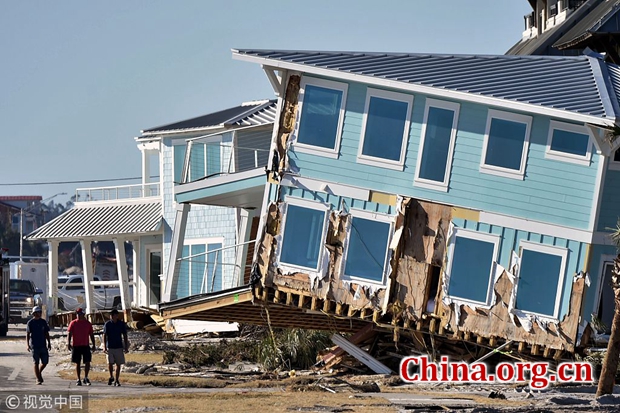Dire consequences of global warming
- By Sajjad Malik
 0 Comment(s)
0 Comment(s) Print
Print E-mail China.org.cn, October 20, 2018
E-mail China.org.cn, October 20, 2018

The UN Intergovernmental Panel on Climate Change in its latest report has warned that global warming would touch disastrous levels if immediate steps were not taken by the international community to cut back on the emission of greenhouse gases and other similar toxic agents that contribute towards making the planet hotter.
The IPCC report issued at the start of the week took three years and focused on the slow drift towards the abyss even after the 2015 Paris Climate Agreement, a hopeful attempt to save the future of mankind.
The Paris accord shows that countries agreed to keep the global temperature below 2 degrees Celsius above pre-industrial levels and to make efforts to limit it to about 1.5 degrees C.
But the IPCC probe says that the crucial threshold of 1.5 degrees Celsius or 2.7 degrees Fahrenheit above pre-industrial levels will be reached as early as 2030, initiating natural calamities previously unheard of.
The crucial part of the grim warning is that planet is already two-thirds of the way there, as the global temperature has increased about 1 degree Celsius. If we decide to sit back and watch indolently, the majority of us would live through the disaster with the arrival of a 1.5 degree C red line.
Imagine droughts, heat spells, and wildfires in some parts of the world while others experience massive rainfalls and floods. The food security will be the first casualty, followed by starvation and even war for simple commodities.
To avoid the collective death, the emission of carbon dioxide should be reduced by 45 percent from 2010 levels by 2030 and should be brought to zero by 2050, according to experts.
The reduction of carbon dioxide is possible by first increasing the natural process like planting more trees and second by having new technologies to completely remove the use of deadly gas for industrial purposes.
The cap on emissions will help to keep the temperature growth below 1.5 degree C and enable us to live with relative peace and prosperity. A failure to do so would change everything and might lead to the extinction of human life on planet earth.
To achieve this, we need to have a global will that was reflected in the Paris Agreement of 2015. The historic deal was supported by 197 countries including the United States.
However, a lot has changed since then, primarily due to the election of Donald Trump who reversed the decision to join the deal. It has weakened the resolve to fulfill the commitments solemnly agreed upon in Paris.
Unfortunately, once again the U.S., which reportedly is the largest polluter, played a negative role to destroy the global consensus. However, there are still plenty of Americans who are working to contain global warming.
Let us hope that the U.S. administration will review its decision for the sake of welfare of its own people as well as the rest of the world. Those still adamant that global warming is a hoax will sooner realize the mistake after seeing the writing on the wall.
Hurricanes are battering the United States and other parts of world, which is due to the fact that the global temperature has risen by almost 1 degree C. We are in fact living in a time when the long term consequences of global warming are becoming evident.
The IPCC report also shows that the impact of even keeping temperature rise at or below 1.5 degrees C will be widespread. It states that temperatures during summer heat waves might increase by 3 degrees C.
The failure to meet the Paris agreement obligations would result in permanent damage to the environment. Experts believe that even a small increase beyond the prescribed limits of 1.5 degree C will increase the risk.
The good part is that we can still avoid the dreadful end by speeding up efforts to check the emission of greenhouse gases. The bad news is that there is no other option besides taking direct action.
Failure means a sure death, with the options of either drowning in rising sea levels and floods or starvation due to global crop failure.
Sajjad Malik is a columnist with China.org.cn. For more information please visit:
http://m.91dzs.com/opinion/SajjadMalik.htm
Opinion articles reflect the views of their authors, not necessarily those of China.org.cn.





